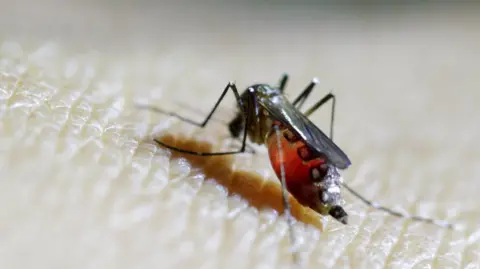Recent developments concerning mosquito-borne diseases have stirred concern in the UK, especially following the detection of the West Nile virus in Nottinghamshire. As highlighted by the UK Health Security Agency (UKHSA), fragments of this virus, which has the potential to cause serious illness, were found in wetland areas known as Retford. This discovery marks a significant development, leading virologist Professor Jonathan Ball, who directs the Centre for Global Virus Research at the University of Nottingham, to predict that the geographical spread of diseases borne by mosquitoes may expand due to climate change.
The presence of the West Nile virus, a pathogen typically transmitted by mosquitoes and primarily affecting birds, has generated public interest and concern. Professor Ball communicated that while the virus occasionally infects humans, severe symptoms are rare. Only about 20% of those infected display flu-like symptoms such as fever. Even more concerning is the observation that approximately 1 in 150 infected individuals could develop more dangerous complications. Despite this, the professor reassures the public that there have been no reported human cases of West Nile Virus originating within the UK so far.
Setting the context of climate change and its impact on viral distribution, Professor Ball noted that the warming temperatures would likely enable tropical diseases to establish themselves in regions previously inhospitable. He emphasized a growing trend where flaviviruses, the group of viruses to which West Nile belongs, are increasingly being detected in the UK. This shift underscores the potential risks associated with climate change, suggesting that such viruses might be capable of spreading further north than ever before.
In a proactive approach to addressing these public health concerns, the Nottinghamshire area, particularly Gamston, is set to undergo enhanced mosquito surveillance this summer. This initiative is part of a broader national project aimed at assessing mosquito activity throughout Britain. Working in collaboration with local councils, such as the Bassetlaw District Council and Nottinghamshire County Council, the UKHSA aims to monitor the environments along the River Idle where mosquito populations may thrive.
Amid these developments, Professor Ball urged the public to remain vigilant but calm about the potential increase in mosquito-borne diseases. He reassured that while it is crucial to acknowledge the rising risk of such diseases spreading, the general populace does not need to panic. Preventive measures can significantly mitigate risk, including wearing protective clothing and utilizing insecticides.
This outbreak of concern surrounding mosquito-borne illnesses comes as a reminder of the complexities involved in environmental change and public health. The rise of the West Nile virus in the UK acts as a profound signal of the broader implications of climate change on ecosystems and human health. Public education and awareness will be essential tools in navigating these challenges and preparing for potential outbreaks.
As the situation unfolds, residents are encouraged to stay informed and engage with reputable sources for updates on both mosquito activity and related health advisories. Moreover, the local community is invited to contribute to discussions and stay connected through platforms such as BBC Nottingham, ensuring a well-informed public ready to respond to emerging health challenges.
In conclusion, while the detection of West Nile virus in the UK’s mosquitoes is a cause for attention, the emphasis on preventive measures and community awareness remains crucial. The collaboration between health agencies and local authorities as seen with the initiative in Retford and Gamston can play a pivotal role in understanding and managing the potential spread of mosquito-borne diseases in an evolving climate.



